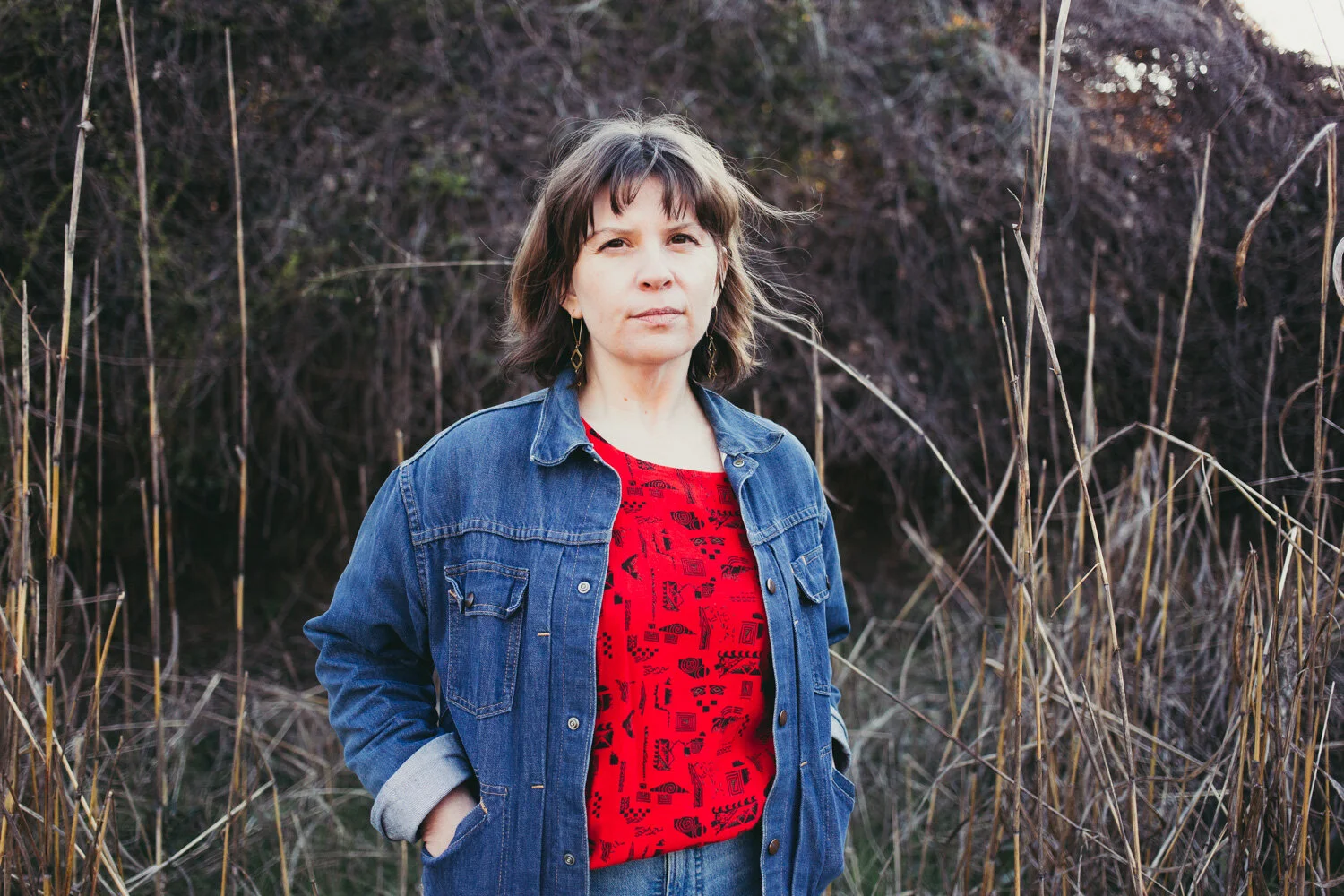JANET SIMPSON
Janet Simpson is a force of intuition. Listening to her play and sing, it’s clear why the Birmingham legend is so frequently called upon to collaborate – lending her presence as a deep, patient listener and her fierce power as a singer, guitarist, and keyboardist to bands like Wooden Wand (World War IV), Delicate Cutters, Teen Getaway, and Timber (her lush folk duo with Will Stewart, who also plays in her backing band). But on Can I See You Tonight (out __ via Cornelius Chapel Records), Simpson’s unmatched prescience is channeled toward her own visions, expansive yet spellbindingly intimate. The follow-up to her stunning solo debut Safe Distance (2021), it’s a wryly observant alt-country tapestry with frayed edges that gesture toward Simpson’s history in DIY and punk scenes. Her talent as a bandleader shines even brighter on this second album as she taps freely into that restless collaborative spirit, weaving worn-in, effortless folk rock arrangements with Stewart, guitarist Jody Nelson, bassist David Somerall, and drummer Shawn Avery. The songs on Can I See You Tonight are haunting stills in time, shot through with longing – the lyrics haiku-precise, the band dialed in to one another, and to Simpson, her deep well of a voice brimming over.
“It’s a time capsule of a very important era of life,” Simpson says of the album. “This was post-pandemic, mid-life stuff I was working with… and the musicians that played on it are really imprinted on me because of that time together.” Though she recorded and toured in projects since the age of fourteen, this was the first time in decades she stepped foot into a space built for the purpose of recording – and a hell of a space, too. Cypress Moon Studios is the historic former location of the Muscle Shoals Sound, where engineer Brad Timko (Dan Sartain, St. Paul and The Broken Bones) recorded and mixed the record. “I think the vibe of the room and the way it sounded made us play better and maybe with more precision, but without sacrificing feel,” Simpson says of the tracking sessions. “We’d take breaks outside and walk along the Tennessee River. In the evenings after being in the studio all day, we would come back to our cabin, cook, listen to music, and tell stories, walk to the end of the driveway to smoke and stargaze. There was this sort of magical feeling.”
This kind of ‘magical feeling’ – whether it's the mysterious connection between people or to a specific place and time – is what Simpson is attuned to, both as a bandleader and as a writer. “My creative process is pretty unintentional,” Janet explains. “I usually just hear something that won’t leave me alone, then I have to drop whatever I’m doing to give it attention, and a few minutes later there’s this song.” She collected all of the songs on the record in these spells of focus during the height of the pandemic, before recording in 2022. In some ways, it was the perfect time to meditate on the themes that have motivated Simpson throughout her career – loneliness and longing – rooting all the way back to her childhood observations of the homesickness and wanderlust in her family members. “This restless feeling that I'm always supposed to be someplace else chases me and shows up in my songs. I really relate to loneliness as a vital part of the human condition. I observe the loneliness of others, too, and always wonder who or what they’re longing for.”
These are themes you hear right off the bat on the breezy opening track, “Porch.” Over a mid-tempo, driving groove glistening with Stewart’s slide guitar part, Simpson sings: “There’s a question on my heart now / I know it’s a heavy thing / But I was driving past your street and wondering if you were thinking of me.” Between verses, Nelson and Stewart trade fingerpicked moments of contemplation and ripping solos that build upon the tension of all this driving and pining. There’s a fire simmering just beneath the surface, reminding me of Lucinda Williams’ “2 Kool 2 Be 4-Gotten,” but if David Roback was in the band.
Like Williams, Simpson’s songs feel rooted in a sense of place, and that isn’t all we’ll see of porches. On the deep-pocket heater “Too Close to the Fire,” the back porch is a sacred meeting ground for people who maybe shouldn’t meet, their “twin flames burning” brighter each time they do. Written as a montage of made-up conversations between four people, it’s a poignant portrayal of these kinds of moments. It’s also one of the record’s catchiest melodies, which is even more delightful on the heels of a two-minute, ethereal intro that moves from fuzzed-out guitar meditations and coagulates into a heavy, full-band swagger reminiscent of Crazy Horse. Guitar feedback almost becomes another voice throughout, howling along with Simpson as she laments: “Nothing feels sadder than the cold hard distance / or the unspoken longing / that stays silenced til we’re drunk and dancing / Way too close to the fire.”
The yearning in Simpson’s songs doesn’t only occur between people, but also within the self, searching for the hidden meanings in life’s smallest moments. On “Violet,” being handed a flower in a dream leads to a rumination on what the possible meanings could be: “A symbol of my early death? A dangerous prophecy? / Was it a sign of love to come blessed by the trinity?” While some of the questions harbor darkness, there’s a sense of hope in the rollicking jam. An overdriven guitar solo bubbles over, emblematic of so many possibilities.
On “Used To Be,” what appears to be grief for a past love is revealed, underneath, to be grief for a past self. As layers of memories are peeled back to get at the heart of the matter, the band sounds like they’re doing the same, holding down a shuffling backbeat as Simpson commands her impressive vocal range, moving between an almost spoken, off-the-cuff delivery and gorgeous, sailing high notes. Somerall’s buoyant bass line lilts the song forward effortlessly. “That was the moment it clicked for me with him,” Simpson says, “How he can go all Thin Lizzy… all the energy of that song feels like it comes from his bass playing.”
Another favorite band moment of Simpson’s is what she jokingly calls “the asshole guitar battle” between Stewart and Nelson on the penultimate track, “Take Me Down,” a testament to ennui and its temptations. The two guitarists take turns circling, moving into frenzied chromatic wanderings and screaming bends, while Simpson’s voice is by turns a belt and a coo. It’s got everything you need from a blues tune, but without any of the tropes – sideways and surprising at every turn.
With the album-closing title track “Tonight,” Simpson delivers a magically timeless love song. Tremolo guitar swells, lithe hand percussion, pitch-bending synth, and girl-group-esque background vocals all swirl in what feels like a casual conjuring. It almost feels like we’ve been dropped into the dreamscape referenced in “Violet,” where a small, tender glimpse of someone might hold a whole world of possibilities. It’s the perfect note to end on – a question. The final chord doesn’t quite resolve, but leans – lingers on.

